Subscribe to our YouTube channel for the latest videos, updates, and tips.
Home | About Us | Contact Us | Privacy | Math Blog
General Form into Intercept Form
We will learn the transformation of general form into intercept form.
To reduce the general equation ax + by + c = 0 into intercept form (xa + yb = 1):
We have the general equation ax + by + c = 0.
If a ≠ 0, b ≠ 0, c ≠ 0 then from the given equation we get,
ax + by = - c (Subtracting c from both sides)
⇒ ax−c + by−c = −c−c, (Dividing both sides by -c)
⇒ ax−c + by−c = 1
⇒ x−ca + y−cb = 1, which is the required intercept form (xa + yb = 1) of the general form of line ax + by + c = 0.
Thus,
for the straight line ax + by + c = 0,
Intercept on x-axis = -(ca) = - Constant termCoefficient of x
Intercept on y-axis = -(cb) = - Constant termCoefficient of y
Note: From the above discussion we conclude that the intercepts made by a straight line with the co-ordinate axes can be determined by transforming its equation to intercept form. To determine the intercepts on the co-ordinate axes we can also use the following method:
To find the intercept on x-axis (i.e., x-intercept), put y = 0 in the given equation of the straight line line and find the value of x. Similarly To find the intercept on y-axis (i.e., y-intercept), put x = 0 in the given equation of the straight line and find the value of y.
Solved examples on transformation of general equation into intercept form:
1. Transform the equation of the straight line 3x + 2y - 18 = 0 to intercept form and find its x-intercept and y-intercept.
Solution:
The given equation of the straight line 3x + 2y - 18 = 0
First add 18 on both sides.
⇒ 3x + 2y =18
Now divide both sides by 18
⇒ 3x18 + 2y18 = 1818
⇒ x6 + y9 = 1,
which is the required intercept form of the given straight line 3x + 2y - 18 = 0.
Therefore, x-intercept = 6 and y-intercept = 9.
2. Reduce the equation -5x + 4y = 8 into intercept form and find its intercepts.
Solution:
The given equation of the straight line -7x + 4y = -8.
First divide both sides by -8
⇒ −7x−8 + 4y−8 = −8x−8
⇒ 7x8 + y−2 = 1
⇒ x87 + y−2 = 1,
which is the required intercept form of the given straight line -5x + 4y = 8.
Therefore, x-intercept = 87 and y-intercept = -2.
● The Straight Line
- Straight Line
- Slope of a Straight Line
- Slope of a Line through Two Given Points
- Collinearity of Three Points
- Equation of a Line Parallel to x-axis
- Equation of a Line Parallel to y-axis
- Slope-intercept Form
- Point-slope Form
- Straight line in Two-point Form
- Straight Line in Intercept Form
- Straight Line in Normal Form
- General Form into Slope-intercept Form
- General Form into Intercept Form
- General Form into Normal Form
- Point of Intersection of Two Lines
- Concurrency of Three Lines
- Angle between Two Straight Lines
- Condition of Parallelism of Lines
- Equation of a Line Parallel to a Line
- Condition of Perpendicularity of Two Lines
- Equation of a Line Perpendicular to a Line
- Identical Straight Lines
- Position of a Point Relative to a Line
- Distance of a Point from a Straight Line
- Equations of the Bisectors of the Angles between Two Straight Lines
- Bisector of the Angle which Contains the Origin
- Straight Line Formulae
- Problems on Straight Lines
- Word Problems on Straight Lines
- Problems on Slope and Intercept
11 and 12 Grade Math
From General Form into Intercept Form to HOME PAGE
Didn't find what you were looking for? Or want to know more information about Math Only Math. Use this Google Search to find what you need.
Recent Articles
-
5th Grade Circle Worksheet | Free Worksheet with Answer |Practice Math
Jul 11, 25 02:14 PM
In 5th Grade Circle Worksheet you will get different types of questions on parts of a circle, relation between radius and diameter, interior of a circle, exterior of a circle and construction of circl… -
Construction of a Circle | Working Rules | Step-by-step Explanation |
Jul 09, 25 01:29 AM
Construction of a Circle when the length of its Radius is given. Working Rules | Step I: Open the compass such that its pointer be put on initial point (i.e. O) of ruler / scale and the pencil-end be… -
Combination of Addition and Subtraction | Mixed Addition & Subtraction
Jul 08, 25 02:32 PM
We will discuss here about the combination of addition and subtraction. The rules which can be used to solve the sums involving addition (+) and subtraction (-) together are: I: First add -
Addition & Subtraction Together |Combination of addition & subtraction
Jul 08, 25 02:23 PM
We will solve the different types of problems involving addition and subtraction together. To show the problem involving both addition and subtraction, we first group all the numbers with ‘+’ and… -
5th Grade Circle | Radius, Interior and Exterior of a Circle|Worksheet
Jul 08, 25 09:55 AM
A circle is the set of all those point in a plane whose distance from a fixed point remains constant. The fixed point is called the centre of the circle and the constant distance is known

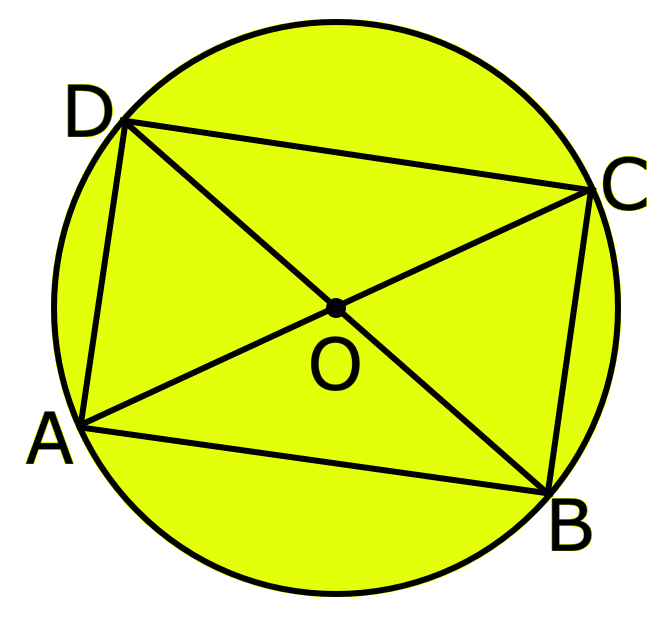
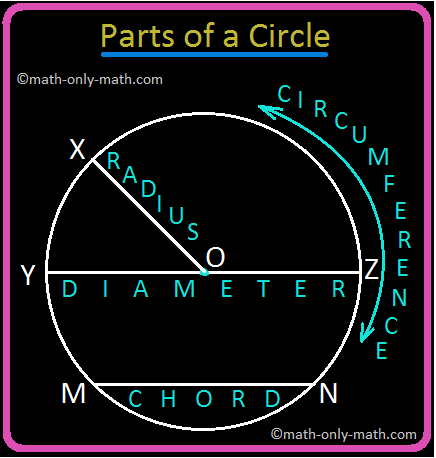
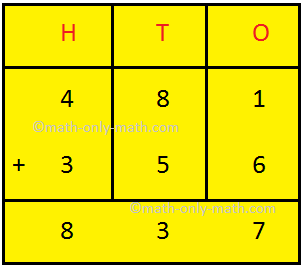
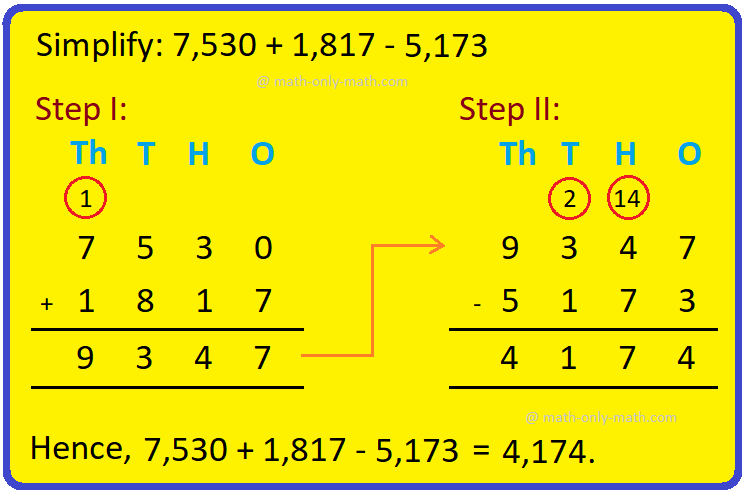
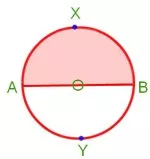
New! Comments
Have your say about what you just read! Leave me a comment in the box below. Ask a Question or Answer a Question.